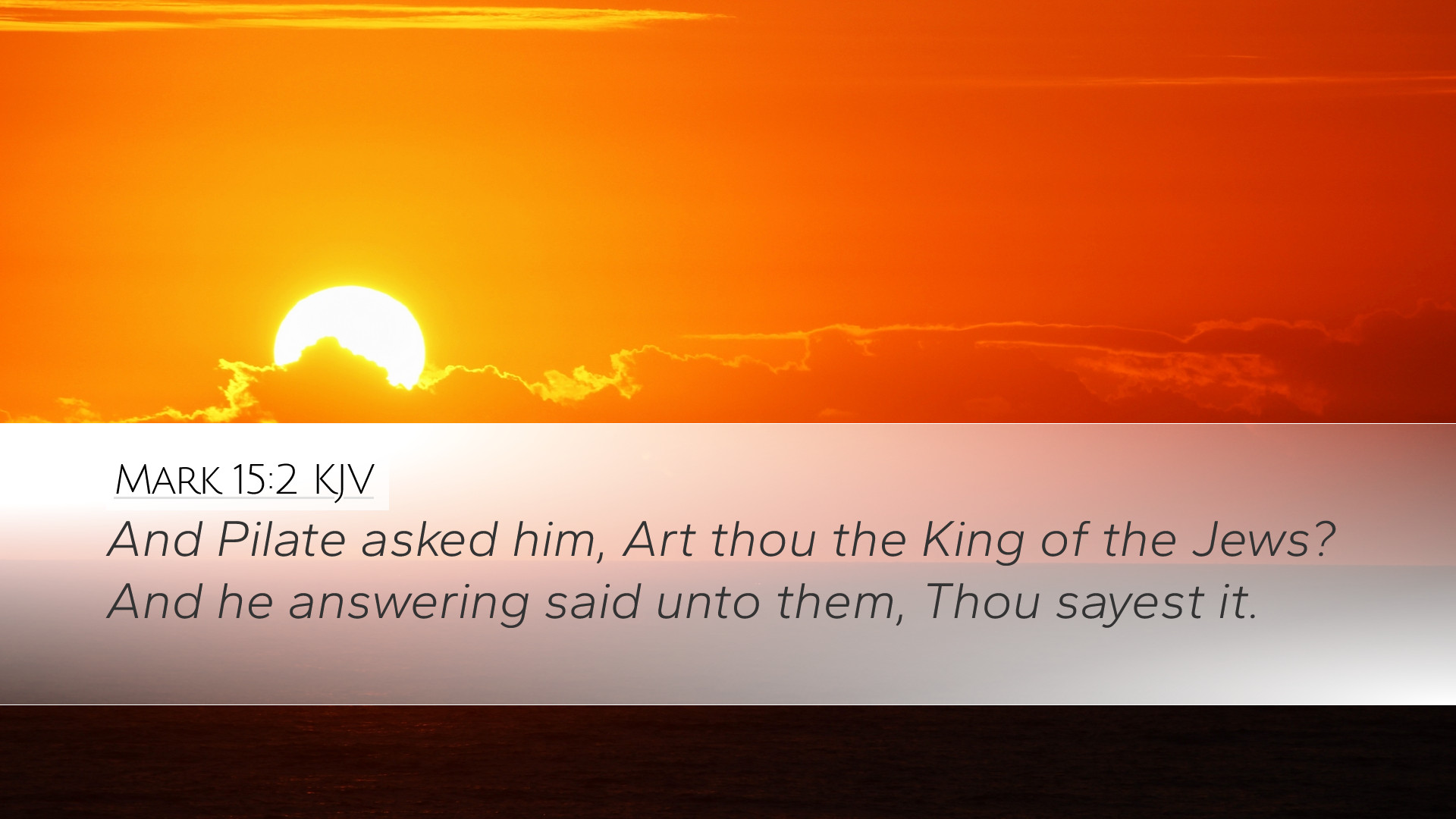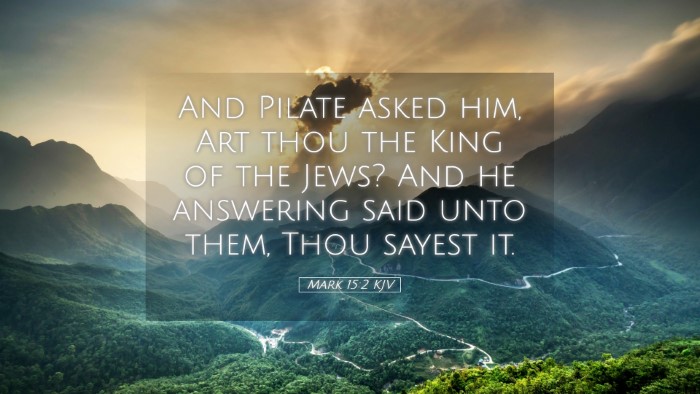Commentary on Mark 15:2
Mark 15:2 reads: "And Pilate asked him, Are you the King of the Jews? And he answering said unto him, You sayest it." This verse presents a pivotal moment in the Gospel narrative, capturing the tension of the trial of Jesus before Pontius Pilate. The significance of this moment can be explored through various insights drawn from public domain commentaries.
General Context
In this chapter of Mark, we encounter the trial of Jesus, which is one of the most critical passages in the New Testament. Pilate's question about Jesus' kingship is central to understanding the political and spiritual implications of Jesus' identity. The public domain commentaries provide a robust examination of this verse.
Insights from Commentary
Matthew Henry's Commentary
Matthew Henry emphasizes that Pilate's inquiry reflects the enigma surrounding Jesus’ identity. He points out that the question is laden with political implications, as declaring someone a king could suggest rebellion against the Roman authority. Henry notes:
- Dual Nature of Jesus' Kingship: Henry explains that while Pilate asks whether Jesus is the King of the Jews, the nature of Jesus’ kingship is of a spiritual realm, not of worldly power.
- First Response: The answer of Jesus, "You sayest it," reveals a profound truth, indicating that Jesus neither fully affirms nor denies the accusation, engaging Pilate in a way that challenges worldly understanding of kingship.
Albert Barnes' Notes on the New Testament
Albert Barnes offers a detailed analysis of the question posed by Pilate. He highlights several points of theological and practical significance:
- Pilate’s Political Position: Barnes notes that Pilate is trapped between his duty as governor and the potential for unrest among the Jewish populace. His inquiry represents both a dismissal of the charges and an attempt to protect his political status.
- Jesus’ Identity: Barnes elaborates that the phrase "You sayest it" serves as an affirmation of Jesus’ true identity while simultaneously pointing to the misunderstanding of His ministry by both Pilate and the Jewish leaders.
- Challenge to Authority: Through this dialogue, Barnes suggests that Jesus subtly critiques the political authority of Pilate, indicating that true kingship is not about dominance but a divine mission.
Adam Clarke's Commentary
Adam Clarke provides a theological lens through which to understand the deeper implications of this encounter. His observations include:
- Fulfillment of Prophecy: Clarke points out that Jesus’ trial fulfills various Old Testament prophecies regarding the suffering servant and the messianic pretender typical of a kingly figure.
- Ambiguity of Jesus’ Response: He emphasizes the wise subtlety in Jesus’ reply, suggesting that it compels the listeners to ponder the true nature of His kingship, which transcends their expectations of a political leader.
- Philosophical Implications: Clarke discusses the philosophical undercurrents of authority represented in this exchange, highlighting the contrast between divine authority and earthly power.
Theological Implications
The interrogation of Jesus by Pilate serves as a rich tableau for exploring themes of authority, identity, and the nature of Jesus' mission. Several theological implications arise from Mark 15:2:
- Kingship of Christ: This verse affirms that Christ's kingship is fundamentally different from earthly rulers. It signifies a kingdom not of this world, which invites deeper reflection on what it means to live under Christ's lordship.
- Human Responsibility: The dialogue highlights human responsibility in acknowledging and responding to the identity of Christ. Pilate's perplexity serves as a warning about the dangers of misunderstanding Christ's nature.
Conclusion
Mark 15:2 is a profound moment in the Gospel narrative that encapsulates the tension between earthly authority and divine truth. The insights drawn from the commentaries of Matthew Henry, Albert Barnes, and Adam Clarke enrich our understanding and invite further reflection on the implications of Jesus’ kingship. This passage encourages pastors, students, theologians, and scholars alike to explore the multifaceted nature of Christ and the transformative power of His message.


